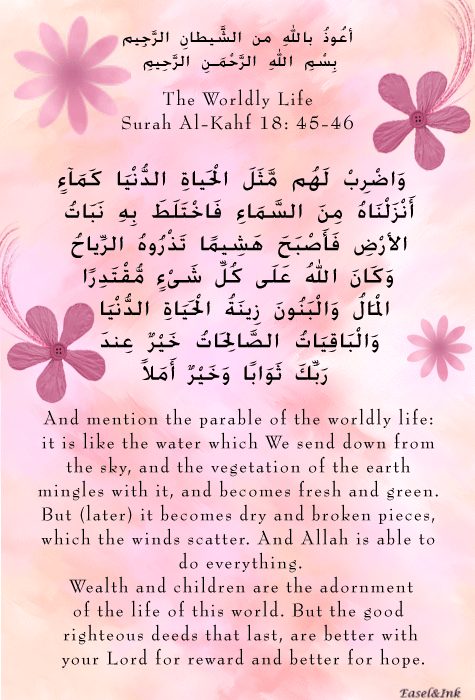Zaza
Librarian


Location : The Wonderful Art Garden
 |  Subject: The Worldly Life (Surah Al-Kahf 18: 45-46) Subject: The Worldly Life (Surah Al-Kahf 18: 45-46)  Thu Oct 31, 2013 8:35 am Thu Oct 31, 2013 8:35 am | |
| The Parable of the Worldly Life Allah says: And mention O Muhammad, to the people, the parable of the worldly life, its transient nature and how it will eventually cease and come to an end. [/Color] it is like the water which We send down from the sky, and the vegetation of the earth mingles with it, It mingles with the seeds that are in the earth, so they grow and become good, producing bright, fresh flowers, then after that, it becomes dry and broken pieces, withered up, which the winds scatter tossing them about right and left. And Allah is able to do everything He has the power to do this and that. In the Qur'an Allah often gives parables like this of the life of this world, as He says in Surah Yunus, The parable of the worldly life is but that of water which We send down from the sky so by it arises the intermingled produce of the earth of which men and cattle eat. .. [10:24] and in Surat Az-Zumar: see you not that Allah sends down water from the sky, and causes it to penetrate the earth, then out from it comes crops of different colors. [39:21] and in Surah Al-Hadid: now that the life of this world is only play and amusement, pomp and mutual boasting among you, and rivalry in respect of wealth and children. (It is) like the parable of vegetation after rain, thereof the growth is pleasing to the tiller... [57:20] and in the Sahih Hadith: This world is sweet and green. (Muslim) Between Wealth and Good Deeds Wealth and children are the adornment of the life of this world. This is like the Ayah: Beautified for men is the love of things they covet; women, children, vaulted hoards of gold...[3:14]. Allah says: Your wealth and your children are only a trial, whereas Allah! With Him is a great reward (Paradise). [64:15] turning towards Allah and worshipping Him is better for you than keeping busy with them, and accumulating wealth for them and going to extremes in feeling pity and compassion for them. Allah says: But the good righteous deeds that last, are better with your Lord for reward and better for hope. Ibn `Abbas, Sa`id bin Jubayr and others among the Salaf said that the good righteous deeds that last are the five daily prayers. `Ata' bin Abi Rabah and Sa`id bin Jubayr narrated from Ibn `Abbas, "The good righteous deeds that last are `Subhan Allah (glory be to Allah)', `Al-Hamdu Lillah (praise be to Allah)', `La ilaha illallah (there is none worthy of worship except Allah)', and `Allahu Akbar (Allah is Most Great).'" The Commander of the faithful, `Uthman bin `Affan was questioned, "Which are the good righteous deeds that last'' He replied, "They are: `La ilaha illallah, Subhan Allah, Al-Hamdu Lillah, Allahu Akbar and La hawla wa la quwwata illa billah hil-`Aliyil-`Azim (there is no strength and no power except with Allah the Exalted, the Almighty).''' This was recorded by Imam Ahmad. Imam Ahmad also recorded from a freed slave of the Messenger of Allah that he said: Well done! Well done for five things! (How heavy they will weigh in the balance! "La ilaha illallah, Allahu Akbar, Subhan Allah, and Al-Hamdu Lillah,'' and a righteous son who dies and his parents seek the reward of Allah.) And he said: (Well done! Well done for five things! Whoever meets Allah believing in them, he will enter Paradise; if he believes in Allah, the Last Day, Paradise and Hell, resurrection after death, and the Reckoning. the good righteous deeds that last, Ali bin Abi Talhah reported that Ibn `Abbas said, "This is the celebration of the remembrance of Allah, saying `La ilaha illallah, Allahu Akbar, Subhan Allah, Al-Hamdu Lillah, Tabarak Allah, La hawla wa la quwwata illa billah, Astaghfirallah, Sallallahu `ala Rasul-Allah', and fasting, prayer, Hajj, Sadaqah (charity), freeing slaves, Jihad, maintaining ties of kinship, and all other good deeds. These are the righteous good deeds that last, which will remain in Paradise for those who do them for as long as heaven and earth remain.'' Al-`Awfi reported from Ibn `Abbas: "They are good words.'' `Abdur-Rahman bin Zayd bin Aslam said, "They are all righteous deeds.'' This was also the view chosen by Ibn Jarir, may Allah have mercy on him. Reference: Tafsir ibn Kathir (abridged) English version. Wa Alaikum Salam wa Rahmatullahi wa Barakatuhu | |
|









 Please check our
Please check our 





